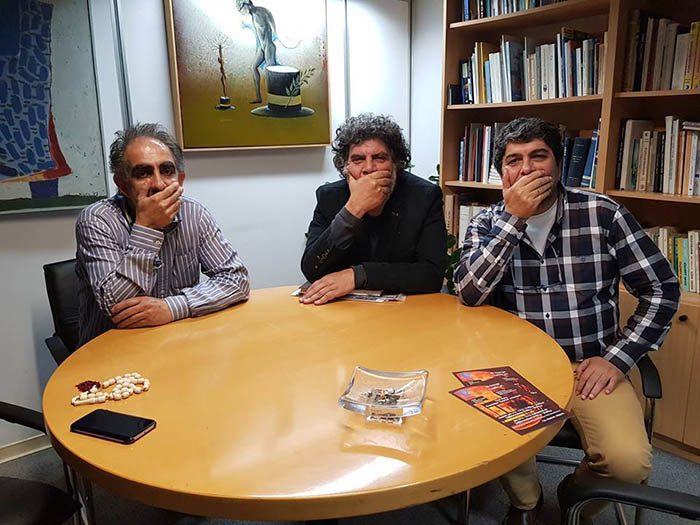[vc_row][vc_column][vc_column_text]

Politis journalists protest their gagging: Sotiris Paroutis, Dionisis Dionisiou and Manolis Kalatzis
In January 2018 a Cypriot court issued an injunction forbidding daily newspaper Politis from publishing emails that were hacked from the personal account of a suspended state attorney, Eleni Loizidou, news website newsit.com.cy reported.
Politis had re-published a number of emails Loizidou had sent from a Gmail account that had been made public by a Russian website. The emails suggested that Loizidou, who was formerly head of extradition requests, may have aided Moscow in the extradition cases of Russian nationals.
Loizidou requested an injunction against the newspaper, preventing it from publishing or using content from the hacked personal account she had used to communicate with the Russian judicial services. The ban is valid until the lawsuit against the newspaper is heard or until another court order is issued.
Loizidou has also filed a lawsuit against Politis seeking between €500,000 and €2 million in damages. The suit claims the newspaper violated her right to privacy and the law on the protection of personal data.
Police officers also demanded that Phileleftheros newspaper remove any articles that reported on the Loizidou case.
The head of Cyprus’ Union of Journalists, George Frangos, defended the newspapers and said: “In no case should the letter of the law be above the spirit of the law which is primarily to serve the common good and public interest.”
In February 2018, the Cypriot press reported that the police have been questioning journalists over the leaked emails. The attorney general, in his statements to the Cyprus News Agency on 4 January 2018, said that: “In a written letter dated 1 December 2017, the Prosecutor’s Office of the Russian Federation requested that a criminal investigation is carried out on the interception of electronic data concerning the Russian Public Prosecutor’s Office.”
Five journalists from the newspaper Politis, two journalists from the newspaper Phileleftheros, two journalists from the newspaper Kathimerini, two journalists from the Sigma TV and a journalist from the newspaper Alithia were summoned to question.
The first journalist who was called in was Manolis Kalatzis from Politis. “The investigators informed me of my rights and announced to me that I am suspicious of criminal offences,” Kalatzis told Mapping Media Freedom adding that he was asked to recognise his articles and reveal his sources.
“It was a clear attempt at gagging the press, as there were the civil lawsuits against journalists claiming compensations of millions of euros. At the same time, Loizidou remains in her post and is being audited only for offences punishable by reprimand,” Kalatzis said.
The Cypriot journalists’ union condemned that the questioning of journalists “constitute a hindrance to the freedom of expression and the media freedom”.
“Now, police are summoning journalists one after the other and question them as suspects of violating the law because in their articles they use one or two words or phrases already made public like ‘Dear Vladimir’ or ‘Really missed you’,” Philelftheros’ editor-in-chief, Aristos Michaelides, wrote in a front-page op-ed accusing the police of abusing their power.
“The authorities must stop harassing journalists and treating them as if they are criminals,” said the IFJ General Secretary Anthony Bellanger. “We stand in solidarity with all those seeking to expose the truth.”
OSCE representative on Freedom of the Media Harlem Désir also expressed concern about the court decision in Cyprus as well as the questioning by the police of several journalists of the daily newspapers Politis and Phileleftheros. “It is essential that journalists be free to report on issues of public importance,” Désir said after sending a letter to Foreign Minister Ioannis Kasoulides, referring to media reports about leaked emails between state attorney Eleni Loizidou and Russian officials. Désir also stressed that journalists should not be questioned by the police about their work.
Moreover, on 19 March, six Cypriot MEPs sent a written question to the European Commission, asking whether the Commission is aware that “journalists are being called in for questioning by the police authorities in Cyprus under suspicion of conspiring to commit an offence” and whether it considers that “there may be problems with freedom of the press and the freedom of expression of journalists in Cyprus”.
On the 3 April, Cyprus’ attorney-general decided not to prosecute journalists for the leaked emails. In an announcement from the Legal Service, it is noted inter alia that the decision was taken because it was concluded that the prosecution of journalists is not in the public interest.
It added that the case raised two kinds of public interest — one was safeguarding personal communications and the other was the public’s right to be informed about issues of public interest.
“Weighing the two…and after taking into account the relevant national and European case law, as well as more general legal principles, the attorney-general judged it would not serve the public interest if he launched a criminal prosecution,” the statement said. [/vc_column_text][/vc_column][/vc_row][vc_row][vc_column][vc_column_text][/vc_column_text][/vc_column][/vc_row][vc_row][vc_column][vc_basic_grid post_type=”post” max_items=”4″ element_width=”6″ grid_id=”vc_gid:1525771631211-2562d882-930f-2″ taxonomies=”6833″][/vc_column][/vc_row]




